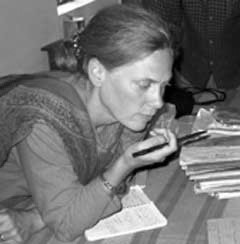Jana Fortier
- Profile
- Publications
- Teaching
Profile
Jana Fortier graduated from the University of Wisconsin-Madison with a Ph.D. in Anthropology and minor concentration in South Asian Studies. Her dissertation research focused on informal economic practices such as sharing, hoarding, theft, loans, barter, sharecropping, jajmani, etc., and how these exist within capitalist economic systems.
Adding to these interests, Fortier explores the dynamics of cultural survival among indigenous peoples of the Himalayas, the Raute and Raji. Rautes and Rajis live in the border regions of India and Nepal where they specialize in hunting rhesus macaques, langur monkeys, Himalayan porcupine, bats, and Sambar elk. With about 3,000 of the 6,000 population of Rautes and Rajis continuing to subsist on forest-based resources, these endangered hunting and gathering communities face many obstacles to their cultural survival. Raji communities in India have been forcibly settled and denied legal access to most forest resources, and Raute communities in Nepal face shrinking forest resources though most have not been settled.
In addition to Himalayan studies, Fortier is interested in applied studies of cultural survival among indigenous peoples in the Americas. Some of her projects have included:
- Documenting traditional knowledge and culture of southern California Indians as a consultant to a cultural resources management firm, ASM Affiliates (www.asmaffiliates.com).
- Documenting Aymara and Quechua indigenous knowledge of how to build traditional stone terraces, allocate work, share resources, and use folk medicinals for an ethnoarchaeological project.
- Documenting traditional arts of southern California while a consultant to the City of San Diego, Commission for Arts and Culture.
- Directing & filming a 17 minute ethnographic documentary on San Diego Fire Stories: Remembering our Relationship to Fire. The film was part of an award-winning exhibit called Earth, Wind, and Wildfire: Learning to Live with Fire at the San Diego Natural History Museum.
Fortier's writing and projects have been kindly supported by the National Endowment for the Humanities, Fulbright Scholar Program, The Wenner-Gren Foundation for Anthropological Research, The National Endowment for the Arts, and The California Council for Humanities.
Publications
- 2009 (with P. Gardner) “The Ethnography of South Asian Foragers”Annual Review of Anthropology Vol. 38:xx.
- n.d. (with P. Goldstein) "Diasporas Past and Present: Agrarian Colonization in the South Central Andes." (manuscript under publication review)
- n.d. Kings of the Forest: Negotiating Culture and Nature in the Himalayas. (book, under publication)
- n.d. "Where God's Children Live: Forests and Cosmology among Hunter-Gathers." in Symbolic Ecology: Culture, Nature and Society in the Himalaya. Arjun Guneratne, ed., Bloomington: Indiana University Press (Book title tentative, publication in progress)
- n.d. “Contested Forests: Gods, Men, and Monkeys in a Himalayan Heterotopia.” in Marie Lecomte-Tiloine, ed., Nature and Culture in South Asia. New Delhi: Manohar (Book Title tentative, publication in progress).
- 2006 (with K. Rastogi) “Da, Ni, Sum/Khung: Comparative vocabulary of the West-Central Himalayan Languages Rawati (Raji) and Khamci (Raute).” Indian Linguistics 66:105-115.
- 2005 San Diego Folklife in Encyclopedia of American Folklore. Simon Bronner, Editor. Armonk, NY: M.E. Sharpe.
- 2004 (Fortier, J. and K. Rastogi ) “Sister Languages? Comparative phonology of Two Himalayan Languages.” Nepalese linguistics 21:42-52.
- 2004 City of San Diego: Program Report In American Folklore Society Public Programs Bulletin 21:25-27. Bowling Green, KY: Univ. of Western Kentucky Programs in Folk Studies.
- 2004 “Without The Forest, There Is No Life.” Annual Editions: Anthropology 04/05. McGraw Hill, pp. 61-65. (Originally in The World & I, 2002 17(9):190-201)
- 2003 Reflections on Raute Identity.” Studies in Nepalese Historyand Society 8(2):317-348.
- 2002 “The Arts of Deception: Verbal Performances by the Raute of Nepal.” Journal of the Royal Anthropological Institute (formerly Man ) 8(2):233-57.
- 2001 “Sharing, Hoarding, and Theft: Exchange and Resistance in Forager-Farmer Relations.” Ethnology 40(3): 193-211.
- 2000 Monkey's Thigh Is The Shaman's Meat: Ideologies Of Sharing Among The Raute Of Western Nepal.” Senri Ethnological Series 53: 113-47.
- 2000 “End of the Road for Rautes? Nepal’s Last Hunter-Gatherer Forest Nomads Face Extinction in the Name of Development.” Nepali TimesSeptember 2000.
- 1996 " Underthrowing Capitalist Culture: The Development Of Local Currency Systems.” Conscious Choice:Journal of Ecology and Healthy Living. 9(5):61-2.
- 1993 “Land Tenure, Labour Practices, and a Theory of Multiple Modes of Production In Western Nepal.” In Eco-crisis in the Himalaya. Edited by Vir Singh, pp. 263-296. Dehra Dun: International Book Distributors.
- 1993 “Nepalese Indigenous Labor Relations.” Contributions to Nepalese Studies 20(1): 105-118.
Consultant Reports
- 2006 TEA21 Rural Roadside Inventory: Native American Consultation And Ethnographic Study Along Highway 94. Sacramento: California Department of Transportation (Caltrans). 48pp.
- 2004 Assessing the Needs of San Diego’s Folk and Traditional Artists: Final Report. City of San Diego, Commission for Arts and Culture. 112 pp.
Other Significant Works
- 2005 San Diego Fire Stories: Remembering Our Relationship to Fire (17 min. video; J. Fortier, Director/Producer).
- 1995 Beyond Jajmani: The Complexity of Indigenous Labor Relations in Western Nepal. Ph.D. Thesis, University of Wisconsin-Madison. UMI Microform 9609466. 454 pp. illus.
Teaching
Fortier enjoyed teaching as an Assistant and Associate Professor (tenured) at Southwest Minnesota State University from 1996 until leaving the position in 2003 to relocate in San Diego. Over the years, she has guest taught at several universities, teaching a range of courses:
- Archaeology of Hunters and Gatherers
- Cultural Anthropology: Theory and Ethnography
- Culture & Society Through Film
- Dynamics of Biocultural Diversity
- Gender & Culture
- Introduction to Cultural Anthropology
- Introduction to Ethnicity
- Introduction to General Anthropology
- Introduction to North American Indians
- Introduction to Physical & Biological Anthropology
- Introduction To Sociology
- Social & Cultural Change
- Survey of Asian
